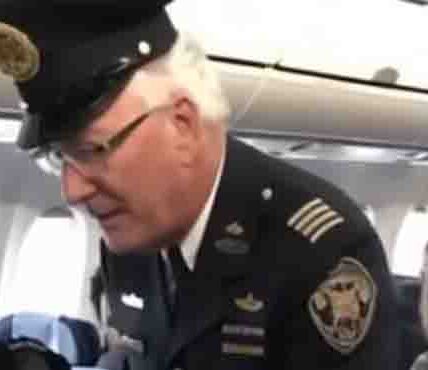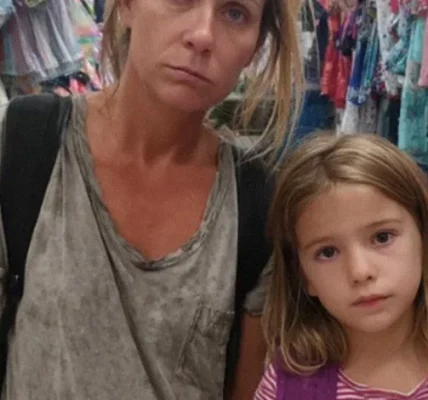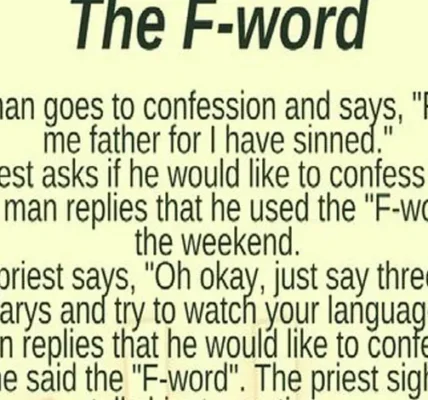I just needed a few screws. That’s all. Just a quick trip to Lowe’s, in and out. But life has a way of throwing wrenches into the simplest plans.
As I rolled through the store, I heard it before I felt it—snap. Then suddenly, the right wheel of my chair wobbled, and before I could react, it gave out completely.
I barely caught myself before hitting the ground. A couple of customers glanced over but kept walking. Embarrassment flooded my face as I struggled to adjust. The chair was useless now.
“Hey, you okay?”
I looked up to see a guy in a blue vest, kneeling beside me. His name tag read “Eddie.” Before I could even answer, he was already waving another employee over.
Within minutes, I had three Lowe’s workers around me. One brought out a rolling cart. “Let’s get you sitting somewhere safe,” she said, offering a hand. Another grabbed my busted wheel, turning it over like a mechanic inspecting an engine.
“I think we can fix this,” Eddie said. “Give us a few minutes?”
I wasn’t sure what else to do but nod. They rolled my chair to the back, leaving me perched on the cart like some kind of makeshift throne. I expected them to come back and say, Sorry, nothing we can do. But instead, I heard drills. Saw sparks fly from a welding tool.
Fifteen minutes later, they rolled my chair back out, good as new.
“We reinforced the axle,” one of them said, grinning. “Should hold up better now.”
I ran my hands over the frame, speechless. “I—how much do I owe you?”
Eddie shook his head. “Nothing, man. Just glad to help.”
And then, as I looked at them standing there, something hit me—something I never expected. It was a wave of gratitude so strong it nearly brought tears to my eyes. In that moment, I realized that small acts of kindness can turn a bad day around faster than you’d ever believe.
I’ve been using a wheelchair for a few years now, ever since a car accident left me unable to walk comfortably. It was a tough transition, but I always tried to stay positive. I’ve gotten used to how people look at me, or how they don’t look at me—like in the store, when folks noticed my wheel snapping but kept going. It can feel lonely sometimes, but I’ve also come across some of the best souls in everyday places.
And let me tell you, I wasn’t expecting such kindness at a big-box store. I mean, sure, I expected to find the screws I needed for fixing my kitchen drawer. But I never would have guessed I’d have my wheelchair repaired on the spot. Eddie and the other employees—one named Tessa and the other Manny—literally dropped what they were doing to help a stranger in need.
As I tested out the wheel and rolled around a bit, Eddie stuck by my side, making sure the chair felt right. The reinforced axle made it glide smoother than before. It almost felt better than new.
“Told you we could fix it,” he said with a proud smile.
“Yeah,” I replied, laughing. “Guess I shouldn’t have doubted the folks at Lowe’s.”
Tessa folded her arms, a mock-serious expression on her face. “Hey, we may not be an auto shop, but we’ve got our ways.”
Manny chuckled, wiping his hands on his jeans. “Had to dust off the welding tools from the training area. We don’t do major repairs for customers usually, but we’ve got some metalworking supplies in the back.”
It struck me then how they took time away from their regular tasks—stocking shelves, helping other customers, running the registers—just to fix my wheelchair. And they didn’t even ask for payment. They refused any tip. It was purely out of the goodness of their hearts.
I thanked them all about a dozen times, but I still had to get those screws I came for. Eddie helped me wheel over to the hardware aisle. He knew exactly where they were, of course. While we searched, he told me he had a niece who used a wheelchair too.
“She’s only seven,” he said softly, scanning the shelf for the right-size screws. “Diagnosed with a spinal condition at birth. She’s a sweetheart. I guess in a way, when I saw you struggling out there, it reminded me of her.”
His words added a layer of meaning to his kindness that I hadn’t realized. He wasn’t just doing a good deed; he had a personal connection. He knew what it was like for someone he cared about to face challenges with mobility. Suddenly, everything made sense—the urgency, the generosity, the way he instantly wanted to help.
“You’re a good uncle,” I said.
Eddie just shrugged. “You’re a good person. And good people deserve a break now and then.”
That one sentence sparked another wave of gratitude in me, and I couldn’t stop smiling. I found the exact screws I needed, and before I checked out, Tessa and Manny came by to make sure I was all set.
“If you ever need anything else,” Tessa said, “just stop in. You know where to find us.”
Manny patted the back of my chair lightly. “Keep an eye on that wheel, but I think it’s going to last you a good long time.”
I promised them all I’d spread the word about their kindness—because too often, we only hear about what’s wrong in the world. We rarely hear stories about everyday heroes who go above and beyond for a total stranger. I wanted everyone to know there are good people out there, that empathy isn’t dead.
On my way out, I decided to grab a coffee from the café across the street. The trip that should’ve taken me ten minutes had turned into an hour-long adventure, but I didn’t mind one bit. I couldn’t shake the feeling of disbelief and happiness. It was as if the day had been illuminated with an extra dose of warmth.
I rolled up to a table and sipped my coffee, replaying everything that had just happened. I thought about the times in my life when I assumed no one cared enough to help. About the times I felt invisible. And here I was, with a freshly reinforced wheelchair, the product of spontaneous teamwork from people who genuinely cared.
A young couple sat at the table next to me, and they gave me a quick smile. I smiled back, feeling more open and friendly than I had in weeks. It’s amazing how much a single act of kindness can shift your perspective on everyone around you.
The coffee tasted sweeter, somehow. And my gratitude lingered, filling the room with quiet positivity. If Eddie, Tessa, and Manny could drop everything to help me, maybe I could find ways to pay it forward, too. Maybe I could do something equally unexpected for someone else.
I did fix that drawer in my kitchen when I got home—a couple of turns of the screwdriver, and it was done. Funny how the simplest chores can spiral into an unforgettable experience. I kept running my fingers over the new weld on my wheelchair axle, almost like I was afraid it wasn’t real. But it was. And it was strong, a reminder that people can be strong for you when you need it most.
Before I called it a day, I sent an email to Lowe’s customer service, highlighting the employees who went out of their way to help me. I wanted their manager to know how much they impacted my life. The next morning, I even got a reply from the store manager, letting me know those employees were being recognized for their efforts.
Sometimes, it’s in the unplanned moments that we find the greatest displays of kindness. Life can throw sudden obstacles at us—a broken chair, a missed bus, an unexpected bill—but there are people out there ready to help if we just let them. Eddie, Tessa, and Manny reminded me that we’re never truly alone. One compassionate act can shift an entire day, or even an entire worldview.
We’re all capable of doing something that might seem small to us but can mean the world to someone else. It might be fixing a broken wheel, it might be offering a listening ear, or just smiling at someone who seems down. Those things matter. They build bridges between us as humans.
So, if you ever see someone stuck—literally or figuratively—don’t be afraid to step in. You never know how much your kindness might mean.
If this story touched your heart or made you think about the good we can all do, please share it with someone who might need a reminder that kindness is alive and well. And don’t forget to like this post so more folks can hear about the power of simple acts of compassion. Who knows—you might inspire someone else to perform a similar act of kindness tomorrow.


